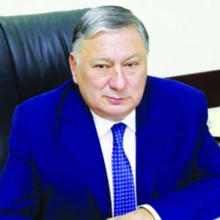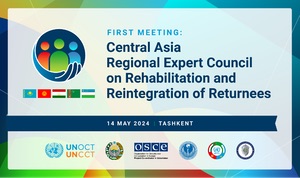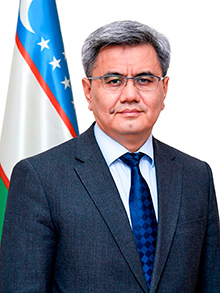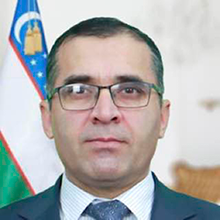Shavkat Mirziyoyev: “I devote my life to the Uzbek Nation”[Over]  Qudratilla Rafikov,
Political scientist Qudratilla Rafikov,
Political scientist
In the speech of our President at a recent meeting with activists of Jizzakh region, one point caught the attention of most of the people. In it, the head of state said the following:
"If God gives me health and life, the days will come when we will not have poverty and unemployment. I have devoted seven years of my life to this, created a system for this, created laws, opened the world. I came to this position, so that my people would live well, so that their dreams would come true, so that their children would live in prosperity and be happy, so that their grandchildren would be born healthy, so that medicine would work, schools would work, roads would be smooth...".
READ MORE
- Saturday, 15 June 2024, 09:55
Environmental Challenges: The Future of Human Rights and Sustainable Solutions in a Changing World[Over]  This is the name of the next topic of the IV Samarkand Forum on Human Rights, a traditional international conference to be held in our country on June 13-14, 2024. It is planned to hold three plenary meetings offline and online within the framework of the forum. This is the name of the next topic of the IV Samarkand Forum on Human Rights, a traditional international conference to be held in our country on June 13-14, 2024. It is planned to hold three plenary meetings offline and online within the framework of the forum.
The main goal of this year's Samarkand forum is to discuss issues related to the impact of climate change on human rights on a broad scale and on the basis of information analysis. In addition to gaining the necessary knowledge in this field, the participants of the international conference will have the opportunity to exchange experience and get acquainted with the best practices within the international community.
READ MORE
- Wednesday, 12 June 2024, 23:09
Gender Issues in Contemporary Uzbekistan[Over]  Roxila Mardonkulovna Usmanova, Doctoral Student, Institute of Family and Gender Research, Republic of Uzbekistan Roxila Mardonkulovna Usmanova, Doctoral Student, Institute of Family and Gender Research, Republic of Uzbekistan
Special attention is being paid to further enhancing the status of women in the new Uzbek society and ensuring their rights as a priority value. Gender equality is recognized as a social phenomenon that permeates all aspects of the life and activities of society, encompassing politics, economics, law, ideology, culture, education, and science, shaping the dynamics between women and men. In the words of the President of the Republic of Uzbekistan, Shavkat Mirziyoev, "The stereotype formed in the minds of our people makes me think about many things. Traditionally, we perceive a woman first and foremost as a mother, a keeper of the family hearth. This is undoubtedly true. However, today not every woman should not be just an observer, she should be an active and proactive participant in the democratic changes taking place in the country." Therefore, it can be asserted without exaggeration that in recent years, increasing the political, social, and economic engagement of women in Uzbek society has emerged as a top priority of state policy, driven by the political will of the Uzbekistani leadership.
READ MORE
- Wednesday, 5 June 2024, 22:52
Tashkent will host the first meeting of Central Asia Regional Expert Council in Rehabilitation and Reintegration of Returnees[Over]  Tashkent/New York/Vienna, May 10, 2024. Tashkent/New York/Vienna, May 10, 2024.
On May 14 this year, the first meeting of Central Asia Regional Expert Council in Rehabilitation and Reintegration of Returnees from armed conflict zones will be held in Tashkent.
The Regional Expert Council is being established on the initiative of the President of Uzbekistan, Mr. Shavkat Mirziyoyev, put forward in March 2022 in Tashkent at the high-level conference “Regional cooperation of the countries of Central Asia under the Joint Action Plan for the implementation UN Global Counter-Terrorism Strategy” and supported by international partners.
READ MORE
- Friday, 10 May 2024, 20:23
MIIT: In Uzbekistan, the implementation of 7,656 projects with a total value of $11.6 billion is planned in 2024[Over]  One of the key principles of Uzbekistan's economic growth is the widespread and parallel regional development, based on a deep analysis of the socio-economic situation of the country’s regions, including the study of resource base, production, transport-logistics potential, and demand for various high-value-added products. One of the key principles of Uzbekistan's economic growth is the widespread and parallel regional development, based on a deep analysis of the socio-economic situation of the country’s regions, including the study of resource base, production, transport-logistics potential, and demand for various high-value-added products.
According to the Ministry of Investment, Industry and Trade, based on the analysis results, regional investment programs (RIP) are formed annually and approved by the Government Commission, implemented with the coordination and support of the Ministry of Investment, Industry, and Trade of the Republic of Uzbekistan. Considering the identification of new opportunities, the list of projects expands throughout the year.
READ MORE
- Tuesday, 27 February 2024, 13:00
The Groundwork of Economic Reforms in 2024. On the situation in the economy and the tasks set[Over]  Obid Khakimov, director of the Center for Economic Research and Reforms under the Administration of the Republic of Uzbekistan
Obid Khakimov, director of the Center for Economic Research and Reforms under the Administration of the Republic of Uzbekistan
The dynamic growth of the population of Uzbekistan requires at least high outstripping economic growth rates in order to adequately meet the growing needs and improve the standard of living of people. But this requires new, more balanced and verified approaches to ensure timely achievement of the set goals.
And these new approaches to economic policy were clearly manifested in the decisions taken at the important meetings held at the beginning of the year under the chairmanship of the President of Uzbekistan Shavkat Mirziyoyev on the situation in the economy and the tasks assigned to the economic divisions for 2024.
READ MORE
- Friday, 16 February 2024, 07:50
Uzbekistan is creating its own model for combating corruption[Over]  Qodir Djuraev, MP, Legislative Chamber of Oliy Majlis (national parliament) of the Republic of Uzbekistan
Qodir Djuraev, MP, Legislative Chamber of Oliy Majlis (national parliament) of the Republic of Uzbekistan
One of the most crucial issues in the rapidly changing world is undoubtedly corruption. The human history suggests that this phenomenon brought even the most powerful nations to the brink of collapse.
Corruption is a perilous misfortune with negative impact on the entire human race, on foundation of any state and society, economic development; it undermines rule of law and sharply weakens public confidence in government, hinders advancement of democratic institutions.
Unfortunately, this problem has not been alien Uzbekistan. Until very recently, the latter had been known as one of those countries with highest perceptions of corruption.
READ MORE
- Friday, 9 February 2024, 19:54
|
|